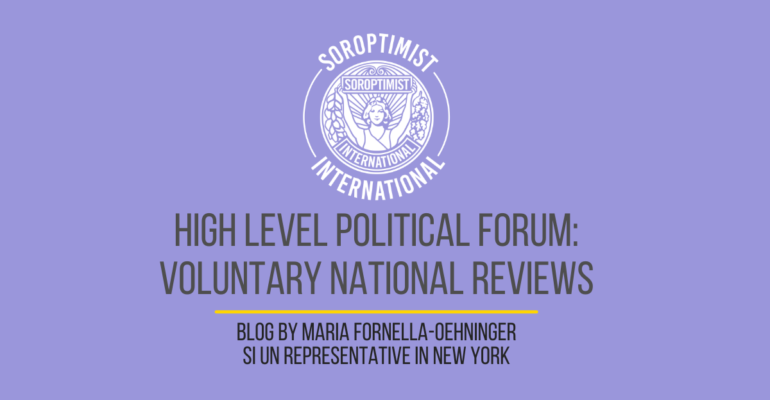After attending this year’s High-Level Political Forum (HLPF), Maria Fornella-Oehninger, SI UN Representative in New York, provides insight into the positives and negatives surrounding Voluntary National Reviews.
“As part of its follow-up and review mechanisms, the 2030 Agenda for Sustainable Development calls on member states to submit voluntary national reviews (VNRs) of their progress toward the Sustainable Development Goals (SDGs). These state-led national reviews are to serve as a basis for the regular reviews by the HLPF meeting under the auspices of ECOSOC, are voluntary, and should be conducted in consultation with civil society and other stakeholders.
The main objective of the VNRs is to facilitate the sharing of experiences, including successes, challenges and lessons learned, with a view to accelerating the implementation of the 2030 Agenda. VNRs also seek to strengthen policies and institutions of governments and to mobilise multi-stakeholder support and partnerships for the implementation of the SDGs. At the same time, and because of the sheer nature of multilateral diplomacy, states use this opportunity to present themselves in the best light, to gain advantages in trade and funding and to compete with others in space and attention. As such, the VNRs as a mechanism for review and follow up of the implementation of Agenda 2030 fall short of their main purpose and aspirations.
This year’s HLPF was held in person since 2019. It was very well attended by member-states at ministerial and permanent representative levels, as well as Civil society, with the latter holding many side events in person, virtually and in hybrid mode. It was very encouraging to see civil society challenging member states’ VNRs from the floor, which they did very effectively.
A case in point was that of Barbara Terenzi, representing Global Call to Action – Italy, on behalf of the Italian organisations that belong to the network. In a crisp, five-minute presentation, she called on the Italian government on the need to reinforce linkages between the National Plan for Recovery and Resilience with its Agenda 2030 commitments and to conduct the VNR presentation process in a more participatory way, allowing for consultation and more public scrutiny. In this regard, indicators and metrics must be shared with Civil society, she said. Italy must also keep its commitments on clean energy transition and “not use the Ukraine war as an excuse to slow down” its ecological commitments. She further questioned the short-term character of increased official development assistance for refugees and other “covid- related commitments”: long-term structural reform is needed to meet the internationally agreed GNI objective of 0.07%.
The Representative of Morocco had earlier asked his Italian counterpart on his country’s commitment to its Policy of Inclusivity in the Mediterranean area and North Africa, so this was a recurrent theme in Italian foreign policy.
This critique of “using” the Ukraine war as an excuse to postpone commitments was heard more than once, and not only from the part of civil society voices: the Benin representative, for example, in view of the coming famine in the African continent, called on the developed countries not to leave people behind. “On peut fabriquer du pain sans ble”, he said expressively.
If we can talk of a “winner of this year’s VNR contest”, that would be Jamaica. Presenting for the second time, Jamaica reported that in 2021, its Vision 2030 Jamaica – National Development Plan was 95% aligned with the SDGs. The country is in the process of developing a multidimensional poverty index and remains committed to leaving no one behind by prioritising the most vulnerable in policymaking and programming. However, a Major Group representative of Civil Society challenged Jamaica on the consultation aspect in its preparation of the VNR, “I do not see any citizen-led initiatives or spotlight reports as participating in the process”, she said.
On SDG 4 (quality education), Botswana attracted our attention when they reported that, while its public expenditure on education stands at 7.1% of gross domestic product (GDP), there is a need to focus more on early childhood and tertiary education. Again, on education, another interesting fact was presented by Jamaica, where the government allocates one of the largest shares of its budget to education, but, while there is equal access to education for both sexes, within the 17-24 age cohort, females are more likely to be enrolled in school and programmes targeting unattached youth. At the tertiary level, underrepresented groups include males, persons from the poorest quintiles, and those from rural areas.
Although the final ministerial declaration of HLPF 2022 fell short of Civil Society expectations, if we focus on the process itself, it does provide a space for civil society to interact with member states and expose their shortcomings. The same can be said of member states who can call on each other to point out where they have or have not fulfilled their international obligations. Another positive aspect is that by engaging in the process of data collection and measurement of progress toward the SDGs, countries must develop their capacity in ways that may remain dormant in the absence of this process.”

